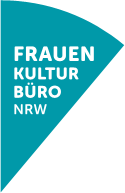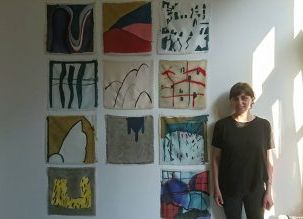Im Frühling 2018 verbrachte die georgische Künstlerin Nino Kvrivishvili im Rahmen des internationalen Austauschprojekts zwei Monate in Deutschland.
FKB: Nino, what was your motivation to apply for the international exchange?
Nino: Since my first time being in artists’ residency abroad, I realized how much experience I can obtain in my artistic practice. Being involved in constantly renewing communities of artists and demanding their reviews and notes, is helping me to pursue my artistic imagination and to grow artistically. When I first read about the international artist exchange program provided by the Frauenkulturbüro NRW, an organization which demands equal rights and possibilities for female artists and additionally has a cultural relationship with Georgia, I immediately decided to apply. I was glad to get a scholarship for 2018 knowing this possibility generates space and time for reflection and discoveries.
FKB: How did you organize your stay in Germany?
Nino: I was very satisfied with the opportunity to stay in two different places. One was Goch, a very small and quiet village which provides a perfect space to get concentrated on my art projects. The Museum Goch maintains a fantastic collection and supports their artists to network and to connect as well with each other as with the public. The director Dr. Stephan Mann and curator Steffen Fischer helped me very much during my residence in Goch, not least to prepare my exhibition in Langenberghaus Goch.
The second place I could stay was the Weltkunstzimmer in Düsseldorf where I could finalize my art project. I’ve met a lot of other participants of the international exchange program to Georgia and was invited by Maria Wildeis to show my works at FAROFF 2018 during the Art Cologne. I attended various exhibitions, concerts and performances there. Besides working on my art project in Goch and Düsseldorf, I took the opportunity to travel around Germany. The travelling around helped me to reflect my work and my artistic development. Additionally, I had the chance to meet the team of the Frauenkulturbüro NRW in Krefeld which was organizing and supporting my stay in Germany. From the very beginning I had an instant bond with manageress of the Frauenkulturbüro, Ursula Theißen, who made my stay even more comfortable and secure. One of my art works is connected with the fabric silk, so I explored Wuppertal, a city known for their textile industry in former times. My artistic attitude increasingly sharpened during my stay in Germany and I will always have a symbolic connection to this place.
FKB: How far does life and art in Germany differ from life and art in Georgia from your point of view?
Nino: I would say, that I found both. There are similarities and differences in life and in art between Georgia and Germany.
FKB: What were the most impressing experiences for you?
Nino: Discovering a new environment, communicating with lots of different people and being a active part of artistic activities were the most impressing experiences during the residency.
FKB: Could you work during the residence in Düsseldorf and Goch?
Nino: Yes, I could! During the residency I worked on an idea connected with time, space and changes. I developed my visual “diary” and interpreted it on aluminum, silk and on transparent paper. It was quite impressive to have an artist’s talk and exhibition at the end of the residency in Goch and Düsseldorf. Parallel I collaborated with the artist from Armenia Gohar Martirosyan on the video piece which was shown in Weltkunstzimmer Düsseldorf and Goethe Institute Yerevan.
FKB: What are your next plans?
Nino: Currently I am further developing my “diary” which I started in Germany. Dozens of small paper drawings are going to be transformed in different materials and scale.
Das Interview führte Heidi Matthias

